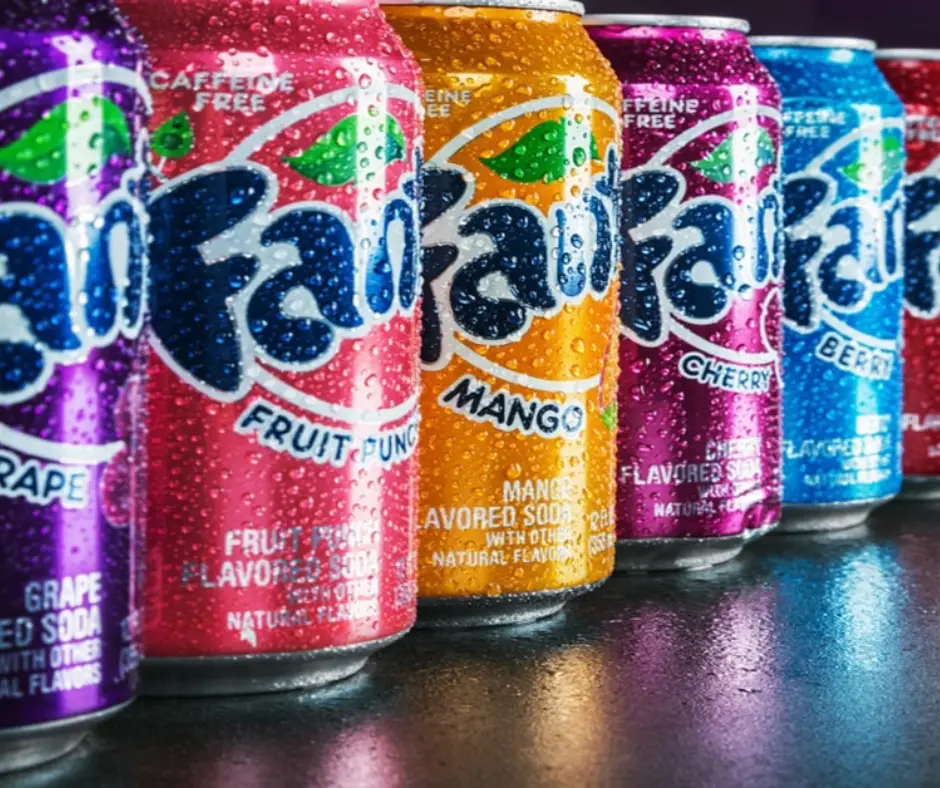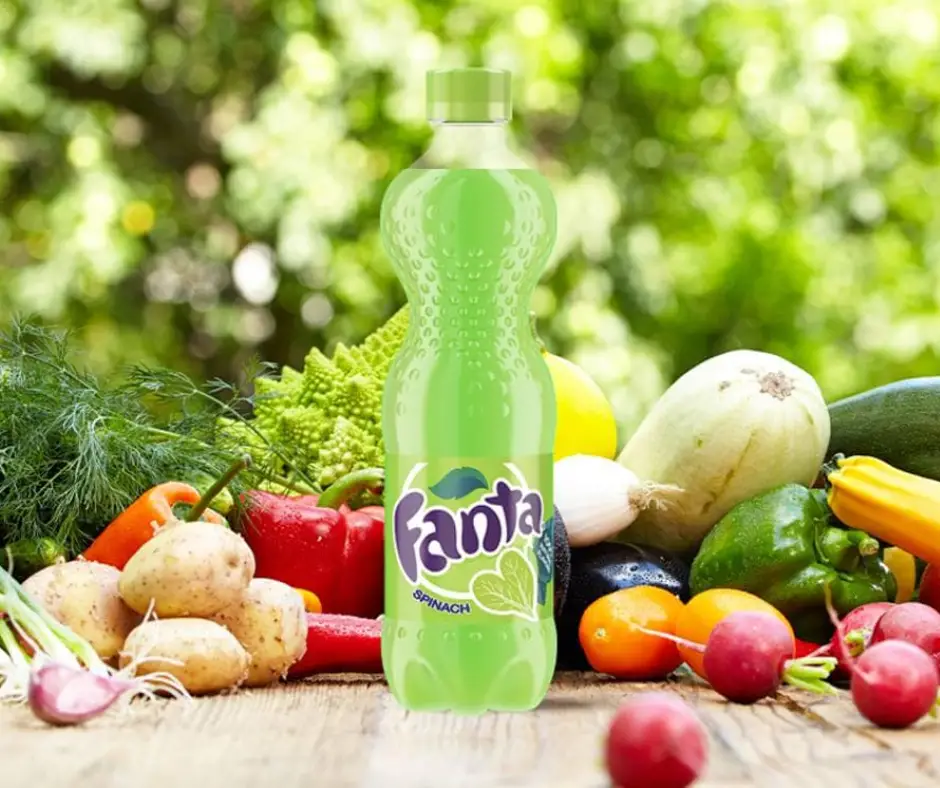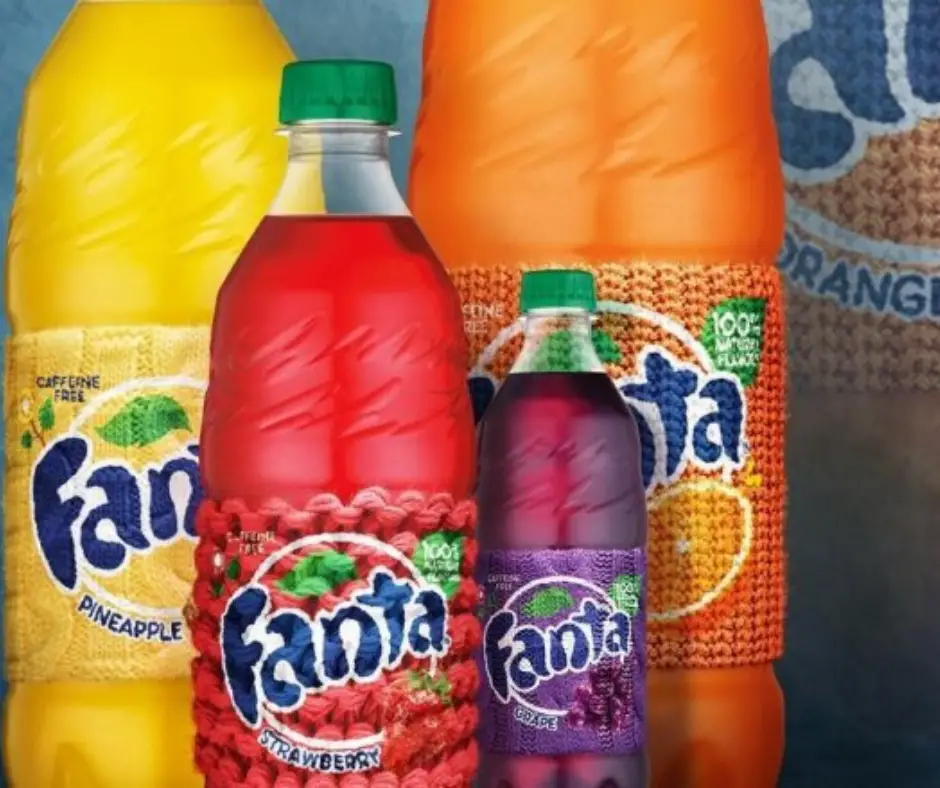Fanta is a popular fruit-flavored carbonated soft drink that has captured people’s taste buds worldwide. But one question often arises is ‘Does Fanta Have Caffeine?‘. Let’s explore the answer to this question and dive into the fascinating world of Fanta.
The History Of Fanta

Fanta originated in Germany during World War II when the Coca-Cola Company faced limited availability of ingredients due to wartime restrictions. The German plant created a new soda using only readily available ingredients; thus, Fanta was born. Over the years, Fanta has become synonymous with its iconic orange flavor, though it now offers over 200 different flavors worldwide.
Different Flavors Of Fanta
Fanta offers a wide variety of flavors to cater to different preferences. Some popular flavors of Fanta include:
- Orange: Fanta’s original and most popular flavor, known for its bright orange color and refreshing taste.
- Grape: A sweet and fruity flavor that grape soda enthusiasts belove.
- Pineapple: A tropical twist on Fanta’s classic flavor, offering an exotic taste.
- Strawberry: A deliciously fruity flavor that is perfect for those who prefer a sweeter taste.
- Mango: A taste of the tropics with its sweet and tangy mango flavor.
With so many different flavors, there is a Fanta for everyone’s taste buds.
As for the question of whether Fanta contains caffeine, the answer is a resounding no. Fanta is a caffeine-free soda option, making it suitable for individuals who want to avoid caffeine.
So, the next time you’re looking for a refreshing and caffeine-free soda, Fanta is a great choice. With its wide range of flavors and rich history, Fanta continues to be a favorite among soda enthusiasts worldwide.
Ingredients Of Fanta
When it comes to answering ‘Does Fanta Have Caffeine?‘, it’s essential to take a closer look at its ingredients. Here are the key components that make up this popular soft drink:
Carbonated Water:
Carbonated water is a primary ingredient in Fanta. Water has been infused with carbon dioxide gas under pressure, creating the characteristic fizz that we associate with carbonated beverages.
Sugar Content:
One of the main components of Fanta is sugar. It adds sweetness to the drink and comes from sources like high fructose corn syrup. It’s important to note that Fanta can contain a significant amount of sugar, with a single can having up to 7 teaspoons. Consuming excessive sugary beverages can lead to health issues like tooth decay and obesity.
Fruit Juices And Extracts:
Fanta also contains fruit juices and extracts to enhance its flavor. These juices and extracts can vary depending on the specific flavor of Fanta. For example, the original Fanta flavor is orange, containing orange juice from concentrate and citrus fruit extracts.
Other Additives:
In addition to the main ingredients mentioned above, Fanta may contain other additives that contribute to its taste, color, and preservation. These additives include natural flavors, citric acid, sodium benzoate, and modified food starch.
Understanding the ingredients of Fanta is crucial for individuals who want to make informed choices about their beverage consumption. It’s essential to consider the sugar content and be mindful of how much Fanta you consume as part of a balanced diet.
For more detailed information about Fanta’s ingredients and nutritional content, visit the official Coca-Cola website or refer to the product label. It’s always a good idea to be aware of what you’re putting into your body and make choices that align with your health and wellness goals.
Overall, Fanta is a popular carbonated beverage that does not contain caffeine. However, it does contain sugar and other additives that should be consumed in moderation. So, if you’re looking for a caffeine-free soda option with various fruity flavors, Fanta can be a refreshing choice.

Caffeine In Fanta
Explanation Of Caffeine Content
One of the questions that often comes up when discussing Fanta is ‘Does Fanta Have Caffeine?‘. The answer is no. Fanta does not contain caffeine. It is a caffeine-free soda that is perfect for those looking to enjoy a refreshing beverage without the stimulating effects of caffeine.
Caffeine is a natural stimulant commonly found in beverages such as coffee, tea, and sodas. It can provide a temporary boost in alertness and reduce the feeling of fatigue. However, not everyone wants or needs the effects of caffeine, which is why caffeine-free sodas like Fanta exist.
Fanta is made with carbonated water, high-fructose corn syrup, natural and artificial flavors, citric acid, and sodium benzoate. It offers a fruity and refreshing taste without adding caffeine, making it a popular choice for those who prefer a caffeine-free option.
Comparison With Other Coca-cola Products
To better understand the caffeine content of Fanta, let’s compare it with other Coca-Cola products:
- Coca-Cola: A 12-ounce can of Coca-Cola contains about 34 mg of caffeine. Unlike Fanta, Coca-Cola is a caffeinated soda known for its iconic taste and worldwide popularity.
- Barq’s Root Beer: Another Coca-Cola product, Barq’s Root Beer, contains caffeine. A 12-ounce can of Barq’s Root Beer has about 22 mg of caffeine.
- Sprite: Sprite is a great choice if you’re looking for a caffeine-free alternative from Coca-Cola. It is a lemon-lime-flavored soda that does not contain caffeine.
- Fanta Zero: For those who want to enjoy the fruity taste of Fanta without the added sugar, Fanta Zero is a sugar-free version of the soda. It is also caffeine-free, making it suitable for those watching their sugar intake.
Overall, Fanta is a caffeine-free soda that provides a fruity and refreshing taste without stimulating effects. Whether you’re looking to avoid caffeine or prefer the taste of Fanta, it is a great choice for a refreshing beverage.
Read more:
- Get The Facts: Does Strawberry Acai Have Caffeine?
- Does Big Red Have Caffeine? Unveiling the Facts
- Does BODYARMOR Have Caffeine?
- Does Fanta Have Caffeine?
- Does Gatorade Have Caffeine? Exploring the Popular Sports Drink’s Ingredients
Health Considerations
Effects Of High Sugar Consumption
It is well-known that excessive sugar consumption can negatively affect overall health. Sugar-sweetened beverages like Fanta are a significant source of added sugars in many people’s diets. Here are some potential health considerations related to high sugar consumption you may want to know in addition to the answer to ‘Does Fanta Have Caffeine?‘:
1. Weight gain: Sugar-sweetened beverages are high in calories but low in nutritional value. Regular consumption of Fanta or other sugary drinks can contribute to weight gain and increased risk of obesity.
2. Increased risk of chronic diseases: High sugar intake has been linked to an increased risk of chronic conditions such as type 2 diabetes, heart disease, and certain cancers.
3. Dental health issues: Drinking Fanta regularly can also negatively affect dental health. The high sugar content can contribute to tooth decay and cavities if proper oral hygiene is not maintained.
Moderation And Alternatives
While indulging in a Fanta now and then may not be harmful, consuming sugary beverages in moderation is important. Here are some tips to help manage sugar intake:
1. Limit consumption: Try to limit your intake of sugary beverages like Fanta to occasional treats rather than everyday drinks.
2. Choose healthier alternatives: Choose healthier alternatives such as water, herbal tea, or infused water with fruit slices for refreshing hydration.
3. Read labels: When purchasing beverages, read the nutrition labels to check for sugar content. Look for drinks that have little to no added sugars.
4. Make your own: Make your own homemade fruit-infused water or natural fruit juices without added sugars.
5. Practice good dental hygiene: Rinse your mouth with water after consuming sugary beverages and maintain good oral hygiene practices like regular brushing and flossing.
It’s important to remember that while Fanta and similar sugary drinks may be enjoyable, moderation is key to maintaining a healthy diet and lifestyle.

Fanta Vs. Other Sodas
Regarding sodas, Fanta stands out as a fruity and refreshing option. But how does it compare to other popular soda brands in terms of caffeine content and overall flavor? Let’s look closely at Fanta and compare it to Coca-Cola and other well-known sodas.
Comparison Of Fanta With Coca-cola And Other Popular Soda Brands
Fanta:
- Fanta is known for its vibrant fruit flavors, with orange, grape, and strawberry options.
- Fanta does not contain caffeine, making it a great choice for those who want to avoid or are sensitive to it.
- It is made with carbonated water, high-fructose corn syrup, natural and artificial flavors, citric acid, and sodium benzoate.
Coca-Cola:
- On the other hand, Coca-Cola is a classic cola soda with a distinct caramel flavor.
- Coca-Cola does contain caffeine, with around 34mg of caffeine per 12 fl oz serving.
- The ingredients of Coca-Cola include carbonated water, high-fructose corn syrup, caramel color, phosphoric acid, natural flavors, and caffeine.
Other popular soda brands:
- While Fanta and Coca-Cola are two well-known brands, other popular soda options are also available. Here are a few comparisons between Fanta and other sodas:
- Sprite: Sprite is a caffeine-free lemon-lime soda, similar to Fanta. However, it has a different flavor profile and is known for its crisp and refreshing taste.
- Pepsi: Pepsi, like Coca-Cola, contains caffeine. It is another popular cola soda with a slightly different taste than Coca-Cola. Pepsi also offers variations like Diet Pepsi and Pepsi Max for those looking for low or no-calorie options.
- Dr. Pepper: Dr. Pepper is a unique soda with a blend of 23 flavors. It does contain caffeine, with around 41mg per 12 fl oz serving. It has a distinct taste that sets it apart from other sodas.
When it comes to caffeine content, Fanta is a great choice for those who prefer a caffeine-free soda. Its fruity flavors and refreshing taste make it a popular option for those looking for something different from classic cola sodas like Coca-Cola. Ultimately, the best soda choice comes down to personal preference and dietary needs. Whether you prefer Fanta, Coca-Cola, or another popular brand, moderation is always key when enjoying these carbonated beverages.
Fanta’s Popularity And Consumer Preferences
Global Reach And Popularity
With its bright colors and fruity flavors, Fanta has gained popularity worldwide. This fruity carbonated soft drink has become a favorite among consumers of all ages. It is available in over 190 countries, making it one of the most recognizable and widely consumed soda brands globally.
Fanta’s popularity can be attributed to several factors:
- Variety of flavors: Fanta offers a range of flavors, with orange being the most common. Other popular flavors include grape, apple, pineapple, and strawberry, each offering a unique taste experience.
- Sweet and tangy taste: Fanta is known for its distinctive sweet and tangy flavor, which appeals to those who enjoy fruity and refreshing beverages.
- Refreshing carbonation: The carbonation in Fanta adds a fizzy quality that enhances the overall drinking experience, making it a popular choice for those seeking a refreshing beverage.
Consumer Opinions And Preferences
Consumer opinions about Fanta are mainly positive, with many enjoying its taste and vibrant flavors. Here are some key points about consumer preferences:
1. Flavor preferences: Orange is the most popular flavor of Fanta, loved for its intense and flavorful taste. However, consumer preferences may vary depending on personal taste preferences and regional availability.
2. Sweetness levels: Fanta is often described as sweet, but opinions on sweetness can differ from person to person. Some consumers appreciate the sweetness, while others may find it too intense.
3. Occasional indulgence: Many consumers view Fanta as a treat or occasional indulgence rather than an everyday beverage due to its high sugar content. It is often enjoyed during social gatherings, parties or as a refreshing drink on hot days.
4. Nostalgia factor: Fanta holds a nostalgic appeal for individuals who grew up drinking it. The brand’s longstanding history and iconic advertising campaigns have contributed to its enduring popularity and loyal fan base.
Fanta’s global reach and popularity can be attributed to its wide variety of flavors, distinctive taste, and refreshing carbonation. Consumer opinions vary, but most enjoy Fanta as a tasty and indulgent beverage for special occasions and nostalgic moments.
FAQ about Does Fanta Have Caffeine?
Q: Does Fanta Have Caffeine?
A: No, Fanta is a caffeine-free drink. It does not contain any caffeine.
Q: What is Fanta made of?
A: Fanta is made using a combination of ingredients, which may vary depending on the specific flavor. Generally, Fanta contains carbonated water, sugar, fruit juice concentrates, citric acid, natural and artificial flavors, preservatives, and stabilizers.
Q: Why was Fanta created?
A: Fanta was created during World War II when Coca-Cola faced a shortage of caffeine due to rationing. They developed a new recipe for a soda that did not contain caffeine, and thus Fanta was born. It was originally created as a more affordable alternative to Coca-Cola.
Q: How many flavors of Fanta are there?
A: There are over 100 different flavors of Fanta sold worldwide. Some popular flavors include orange, grape, pineapple, strawberry, and fruit punch.
Q: Is Fanta a healthy drink?
A: like other sodas, Fanta is not considered a healthy drink due to its high sugar content. It is a carbonated, sugary beverage and should be consumed in moderation. It is important to be mindful of your sugar intake and choose healthier alternatives whenever possible.
Q: Can I drink Fanta if I’m trying to avoid caffeine?
A: Yes, Fanta is suitable for individuals who want to avoid caffeine. It is a great caffeine-free alternative to other sodas that contain caffeine.
Q: Are there any healthier alternatives to Fanta?
A: If you are looking for a healthier alternative to Fanta, you may consider opting for drinks that are low in sugar or sugar-free, such as flavored water, unsweetened iced tea, or infused water with fruits and vegetables.
Q: Can Fanta cause tooth decay?
A: Fanta, like other sugary drinks, can contribute to tooth decay if consumed in excess. The high sugar content in Fanta can lead to dental problems if not properly managed. Practicing good oral hygiene and limiting your consumption of sugary beverages is important.
Q: Can I drink Fanta if I’m pregnant or breastfeeding?
A: It is generally safe to drink Fanta in moderation during pregnancy or while breastfeeding. However, consulting with your healthcare provider for personalized advice based on your specific health circumstances is important.
Q: Are there any Fanta flavors that contain caffeine?
A: No, none of the Fanta flavors contain caffeine. Fanta is a caffeine-free beverage across all its flavors.
Remember to always check the ingredient list and nutritional information on the packaging of any beverage to ensure it meets your dietary needs and preferences.
Conclusion
Recap Of Caffeine Content In Fanta
Now you should know the answer to ‘Does Fanta Have Caffeine?’. After analyzing the data, it can be concluded that Fanta is a caffeine-free soft drink. The original Fanta flavor and most of its variants do not contain any caffeine. While some flavors, such as Fanta Grape, may contain a small amount of caffeine (about 4.5 mg per 12-ounce can), it is significantly lower than other caffeinated beverages like coffee or energy drinks. Fanta Orange, the most popular flavor, is completely caffeine-free. So, if you are looking for a soda without caffeine, Fanta is a suitable choice.
Health Considerations And Consumer Choices
Consuming excessive amounts of caffeine can lead to negative side effects such as insomnia, headaches, and increased heart rate. Many individuals, especially those sensitive to caffeine or looking to avoid it altogether, opt for caffeine-free beverages like Fanta.
Choosing a caffeine-free option like Fanta can be beneficial for individuals who:
- Are they sensitive to caffeine or trying to limit their intake
- Prefer a refreshing and fruity beverage without the stimulating effects of caffeine
- Want to enjoy a carbonated soft drink without the potential negative health effects associated with excessive caffeine consumption.
As with any beverage, it is essential to practice moderation and be aware of other ingredients, such as sugar and additives, when consuming Fanta. It is important to read labels carefully and consider individual health and dietary needs.
In conclusion, Fanta is a popular caffeine-free soft drink offering a range of fruit flavors, making it an enjoyable and refreshing choice for individuals seeking a caffeine-free option. With its sweet and tangy taste, Fanta can be enjoyed by all age groups without the added stimulation of caffeine. Remember to make informed choices about your beverage consumption based on your personal preferences and health considerations.

James Robinson loves coffee and blogging all about coffee. His blog is full of informative posts about the best ways to enjoy coffee and the many different types of coffee out there. He also shares recipes for delicious coffee-based dishes, and his followers can always count on him to offer tips on how to improve their coffee-making skills.
